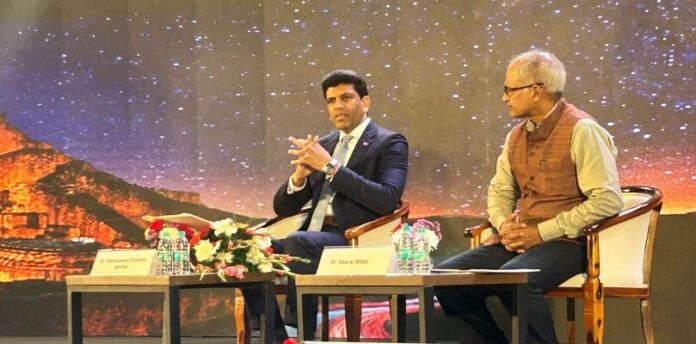Artificial Intelligence took center stage at the International AI Summit inaugurated by Dr. Chandra Sekhar Pemmasani, Minister of State for Rural Development and Communications, and Dr. Neeraj Mittal, Secretary, Department of Telecommunications, at the India Mobile Congress (IMC) 2025. In a speech that combined optimism with caution, Dr. Pemmasani framed AI as both a transformative opportunity and a profound societal responsibility. “Artificial intelligence is not just another technology, it is a transformative force that will reshape how we live, how we work, and how we progress as a civilization,” he said. “With great power comes great responsibility. Innovation without ethics is dangerous; innovation without purpose is divisive.”
India’s Model of “Innovation for Good”
Highlighting India’s record of leveraging digital innovation for public benefit, the Minister drew parallels between AI adoption and earlier national technology milestones. “Aadhaar gave a billion people digital identity and access to welfare with dignity. UPI transformed digital payments into a public good. ONDC is democratizing e-commerce,” he said, underscoring India’s commitment to equitable access.
He also pointed to real-world AI interventions already shaping India’s development story—from disaster management to fraud detection. “During the 2024 floods in Kerala, AI helped save nearly half a million lives,” he said. “Our telecom department’s AI-based Financial Fraud Risk Indicator saved Rs 140 crore within three months and blocked 4.8 million fraudulent transactions.”
AI Across Sectors: Promise and Proof
Dr. Pemmasani cited multiple examples of AI’s expanding impact in health, agriculture, and education. In healthcare, startups such as Niramai have pioneered thermal-based breast cancer screening using pattern recognition. “This technology screened over 100,000 women with 92% accuracy without radiation exposure,” he said.
In agriculture, precision farming powered by AI has raised crop yields by 15 to 20% while saving 30% water, while in education, AI-driven personalization has improved rural school outcomes by 25%, he noted. AI’s contribution to pharmaceutical R&D was also highlighted, reducing the cost of drug discovery by up to 50%, particularly for rare and complex diseases.
Confronting the Risks: Deepfakes, Bias and Privacy
Balancing the optimism, the Minister cautioned that AI’s rapid growth also brings new forms of inequity and harm. “Deep fakes are undermining democracy. Over 50 such videos during the 2024 elections spread misinformation,” he said, warning that “algorithms are creating bias and deepening inequality.”
He cited concerning trends in automated hiring, where AI tools rejected 40% more women in IT roles, and in financial systems that unfairly denied loans to rural applicants. “Technology meant to be neutral became a mirror of our own prejudices,” he said. Healthcare risks, too, are tangible. “In UP hospitals, AI misdiagnosed 20% of tuberculosis cases delaying treatment. These black-box algorithms, when opaque, can be deadly,” he cautioned.
Framework for Responsible AI
To address these risks, Dr. Pemmasani laid out a five-point framework emphasizing fairness, re-skilling, privacy, transparency, and ethics. He called for fairness audits, diverse data sets, and strong data protection laws to prevent algorithmic discrimination and safeguard privacy.
“No algorithm should make life-changing decisions without accountability,” he asserted. “We must demand explainable AI in healthcare, finance, and justice.” On employment disruption, he urged proactive measures: “By 2030, 15–30% of jobs in IT and manufacturing could face displacement. States like Karnataka could see large-scale unemployment without intervention. We must anticipate and protect livelihoods through re-skilling.”
India AI Mission: Building an Ethical Tech Future
The Minister outlined the India AI Mission, a Rs 10,000 crore initiative aimed at building national AI compute infrastructure accessible to startups, enterprises, and researchers. The mission will develop indigenous foundation models reflecting India’s languages and diversity, provide high-quality anonymized datasets, and skill millions of youth through AI-driven future skills programs.
“Our goal is to promote AI that is fair, explainable, transparent, and inclusive,” Dr. Pemmasani said. He also linked AI’s trajectory to the upcoming 6G networks, which he described as “autonomous, self-healing, sustainable, and built on globally inclusive standards.”
Concluding his address, Dr. Pemmasani emphasized that responsible AI cannot be the government’s mandate alone. “Academia, industry, startups, and international partners, you are the foundation, the bridge, the spark,” he said. “The responsibility to innovate and transform doesn’t rest with government alone. It is our collective duty to ensure AI remains a force for good.”







